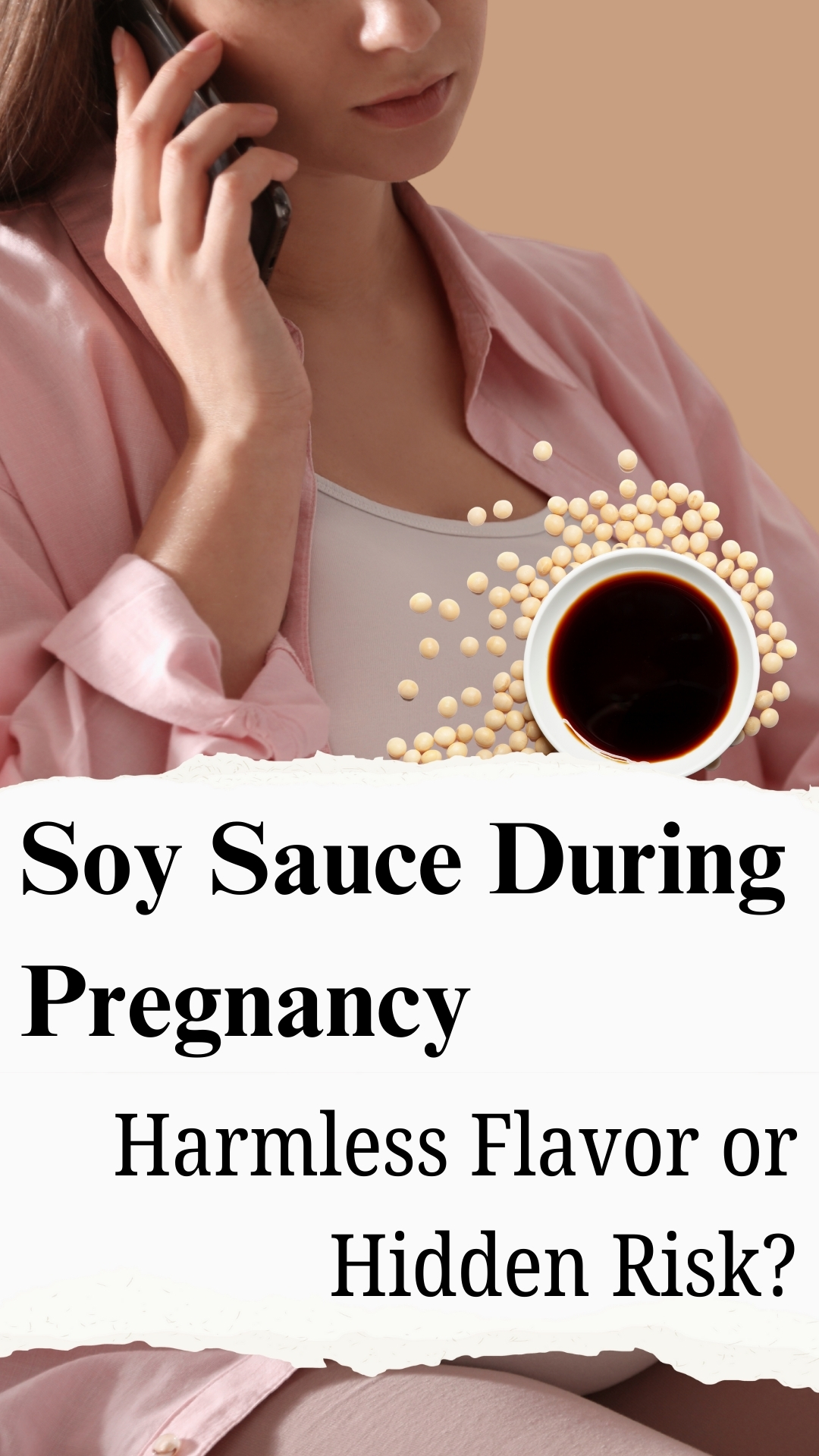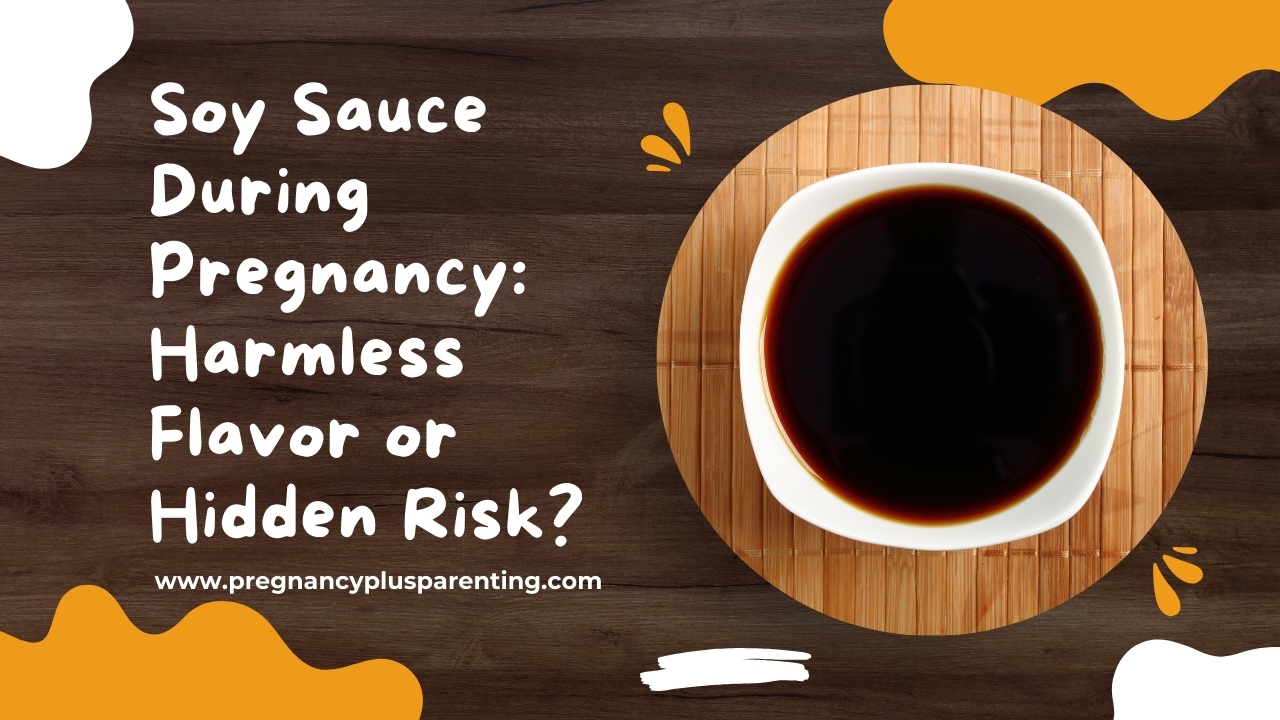Soy Sauce During Pregnancy: Harmless Flavor or Hidden Risk?
Pregnancy is an exciting adventure, but also a time full of questions, especially when it comes to nutrition. You’re probably wondering which foods are on the green list and which you should avoid. Today we want to turn our attention to a favorite ingredient in many dishes – soy sauce.
Yes, you heard right! The dark, spicy concoction that transforms sushi and stir-fries into culinary masterpieces is now in the spotlight. In the thicket of advice and supposed wisdom on nutrition during pregnancy, it’s not easy to keep track. Some healthy foods get an undeserved bad rap, while others are hyped up as “superfoods.”
But what’s the real story behind soy sauce? Should it be a loyal companion during your pregnancy or more of an occasional guest on your plate? Let’s delve into the fascinating world of soy sauce together and answer these questions.
Soy sauce during pregnancy: The controversial pleasure
Pregnant vegetarians and those on a vegan diet should limit their consumption of soy.
It’s obvious that soy and soy products are essential for vegetarians and vegans, as soy is a great alternative to meat and meat products due to its protein content. Many studies have been examining this particular food for years.
However, things are a little different during pregnancy.
There is no established research on whether these legumes could harm you or your unborn baby during pregnancy, as no or only harmless experiments are conducted on pregnant women.
However, an animal study was conducted which suggested that large amounts of soy could cause birth defects in unborn babies.
Soy contains phytoestrogens (plant estrogen), which could negatively affect the healthy development of the baby.
This has even been shown by recent studies investigating the relationship between soy and fetal development. Reason enough to avoid large amounts of soy during pregnancy.
And if it has to be, then the quantity is what matters most!
Soy during pregnancy: How much is allowed?
If you do not want to give up soy sauce during pregnancy, it is best to consult your gynecologist beforehand.
Although there’s no set amount of soy sauce you can consume during pregnancy, you may want to avoid it or limit your intake to one or two tablespoons. An interesting article on the American pregnancy nutrition website states:
Soy sauce should be consumed in moderation because it contains a lot of sodium. A pregnant woman needs about 1500-2300 mg of sodium per day, and soy sauce contains about 1000 mg of sodium per tablespoon (source: National Library of Medicine).
Whether it’s soy, soy sauce, or soybean oil, they can be dangerous in large quantities. Rapeseed oil, for example, is a great alternative to soybean oil, as one tablespoon of rapeseed oil covers your daily requirement of omega-3 fatty acids.
How to choose the right soy sauce
Natural soy sauce is a completely safe product that can be consumed in small amounts (2 tablespoons per day) even by pregnant women.
But natural soy sauce is very difficult to find on supermarket shelves. More than 90% of the soy sauces available for sale are cheap imitations with a large number of preservatives and flavorings.
Since organic sauce requires at least a year of natural fermentation, manufacturers accelerate this process by adding a protein to accelerate fermentation. A brief overview may be helpful.
Such soy sauce is potentially dangerous for pregnant women because it is “packed” with chemicals and does not contain any useful nutrients or vitamins for your body.
Such products even increase the likelihood of food poisoning due to the high content of sodium chloride, which causes salt deposits.
Non-pregnant women who suffer from chronic inflammation of the gastrointestinal tract, gastritis and irritation of the gastric mucosa should also avoid soy sauce.
The easiest way to choose the right product is to read the label. The ingredients of soy sauce, which is cooked under natural fermentation conditions, include only soybeans, wheat grains, salt, and water.
If additional ingredients are listed, for example flavor enhancers, an acidity regulator or a coloring, then it is a chemical that does not contain anything good.
Imitations are usually cheaper and have a more intense, saltier, and deep brown flavor, while natural soy sauce has a mild, sour-sweet flavor and is brownish-red to transparent.
Is soy really the go-to superfood?
It is no news that soy is considered very healthy and oriental cuisine is considered one of the most popular.
The massive demand for soy and soy products is not entirely unjustified, because soy and numerous soy products are rich in protein, contain many vitamins, minerals, unsaturated fatty acids and among them folic acid, which is essential during pregnancy.
In addition, soy also contains fiber that aids your digestion and there are unique combinations of ingredients that give soy products their unique and irresistible taste.
Many dishes are topped with soy sauce, giving it a delicious flavor and making countless dishes more appealing. So, not only does it taste good, but studies have shown it to have many benefits for the body .
Unfortunately, the consumption of soy and soy products during pregnancy is not entirely uncontroversial, as there are no proven indications or guidelines regarding the consumption of these legumes during pregnancy.
Soy sauce and its specific properties
Soy sauce first appeared in a Chinese Buddhist temple about two thousand years ago. According to their culinary canon, monks were not allowed to eat meat or animal products.
Therefore, the local chef looked for ways to add a little variety to the rather boring daily menu, which consisted mainly of rice.
From soybeans, wheat, water, and salt, he created a unique product that we now call soy sauce. Soy sauce gradually spread throughout China and is now used in many cuisines around the world. The preparation of soy sauce is a multi-step and rather complicated process.
First, clean soybeans are mixed with roasted wheat grains and soaked in salted water. Then, all the ingredients are thoroughly mixed and placed in deep vats for fermentation.
This process can take from one month to several years. After the sauce is infused, it is filtered and bottled. Soy sauce is used as a marinade for meat, fish, and salads.
Soy sauce is also available commercially as a pure product, with the addition of ginger , garlic , and other spices. Considering the composition of soy sauce, let’s briefly look at the benefits of soy sauce during pregnancy:
• The salt content in soy sauce is only 6-8%, so it can be a safe alternative to pure salt for you.
• The calorie content of soy sauce is 69 kcal per 100 ml. This way you can add soy sauce to dishes without fear of fat deposits.
• The antioxidants contained in soy sauce prevent rapid aging and protect your body from viral and bacterial infections. Soy sauce’s antioxidant power exceeds even classic lemon and blackcurrant sauce by more than 100 times.
• In soy sauce (due to the technology of its production) live probiotic bacteria are formed that stabilize your intestines and help fight constipation, which is considered one of the main problems of pregnant women.
• Folic acid, considered the most important vitamin during pregnancy , enters your body along with the spices. A folic acid deficiency during pregnancy can impair fetal development and lead to all sorts of birth defects.
• Research shows that soy sauce contains more than 20 essential amino acids, which are responsible for proper metabolism and nutrient absorption. Without them, it is impossible for the fetus to build muscle tissue and develop vital organs and systems.
• The composition of soy sauce is characterized by a high concentration of vitamin C, which is one of the pillars of healthy immunity.
• The spices contained in soy sauce speed up your metabolism. This means you don’t have to worry about gaining weight and can lose the extra pounds without reducing the nutritional value of your food.
Final thoughts
Since the effects of soy, or more specifically soy sauce, on pregnant women have not yet been studied, you should consume soy sauce with a little caution.
If you can, it is best to avoid these legumes altogether and if not, then you should not consume them in large quantities and you should choose organic products.
Soy remains a controversial food that is attracting more and more people. It’s no wonder, since its delicate, sweet and sour flavor leaves no one cold.
Don’t worry if you’ve consumed soy sauce. This food won’t cause major harm in small amounts. During pregnancy, you can occasionally indulge in one or two tablespoons in your favorite dish. But don’t exceed that.
But still, take this advice to heart, consider the risks, and reduce your soy consumption a little during pregnancy.
Read on about hollandaise sauce and Miracle Whip during pregnancy and find out if you can enjoy them.







